Slug
anxiety-disorders
Video
Category
Mood Disorders
Excerpt
Anxiety is a normal reaction to stress and can be beneficial in some situations. It can warn us about potential threats and help us prepare and pay attention. When anxiety disorders are present, there is excessive fear or anxiety as opposed to normal feelings of nervousness or anxiousness.
Authors
Tags
Featured
Ready to Publish
Ready to Publish
Publish Date
Dec 14, 2022
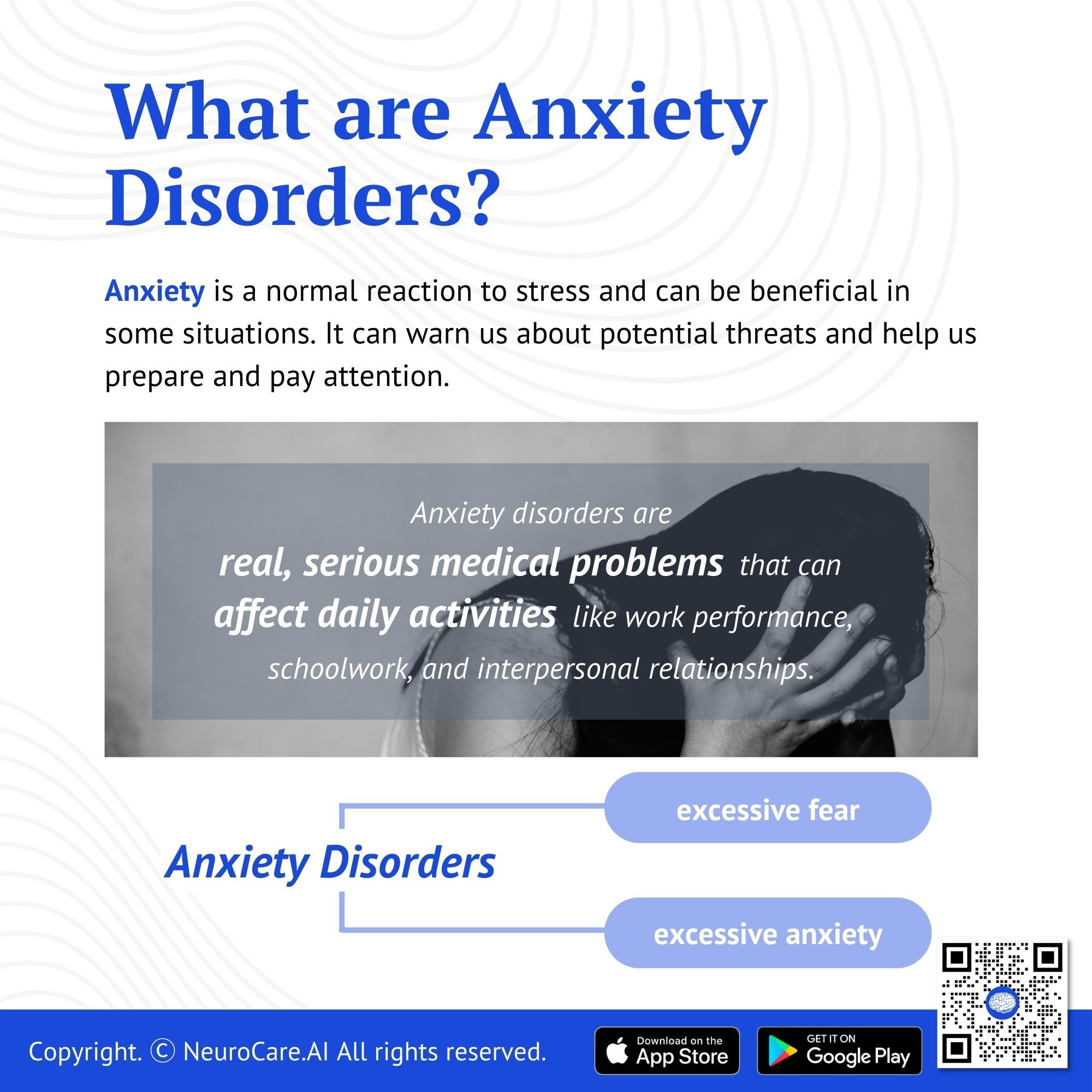
What are Anxiety Disorders?
Anxiety is a normal reaction to stress and can be beneficial in some situations. It can warn us about potential threats and help us prepare and pay attention. When anxiety disorders are present, there is excessive fear or anxiety as opposed to normal feelings of nervousness or anxiousness.
For people with an anxiety disorder, the anxiety persists and may even worsen over time. Anxiety disorders are real, serious medical problems that can affect daily activities like work performance, schoolwork, and interpersonal relationships. They are just as serious and real as physical disorders like heart disease or diabetes. Anxiety disorders are treatable and a number of effective treatments are available. Treatment helps most people lead normal productive lives.
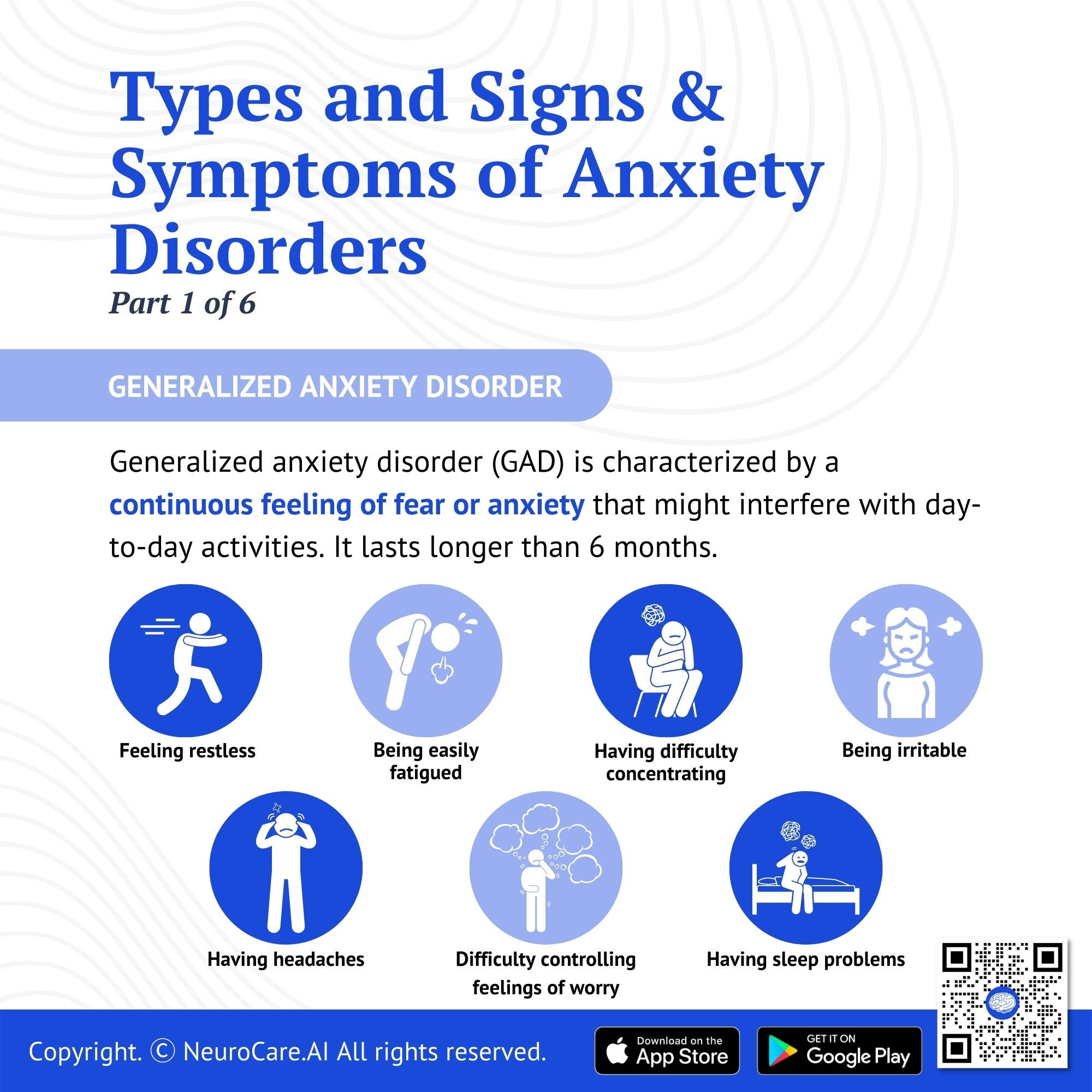
Types and Signs and Symptoms of Anxiety Disorders
There are several types of anxiety disorders, including generalized anxiety disorder, panic disorder, social anxiety disorder, and various phobia-related disorders.
Generalized Anxiety Disorder
Generalized anxiety disorder (GAD) is characterized by a continuous feeling of fear or anxiety that might interfere with day-to-day activities. Worries frequently focus on everyday things like job responsibilities, family health, or minor matters such as chores, car maintenance, or appointments. People living with GAD experience frequent anxiety for months, if not years.
Symptoms of GAD include:
- Feeling restless, wound-up, or on-edge
- Being easily fatigued
- Having difficulty concentrating
- Being irritable
- Having headaches, muscle aches, stomachaches, or unexplained pains
- Difficulty controlling feelings of worry
- Having sleep problems, such as difficulty falling or staying asleep
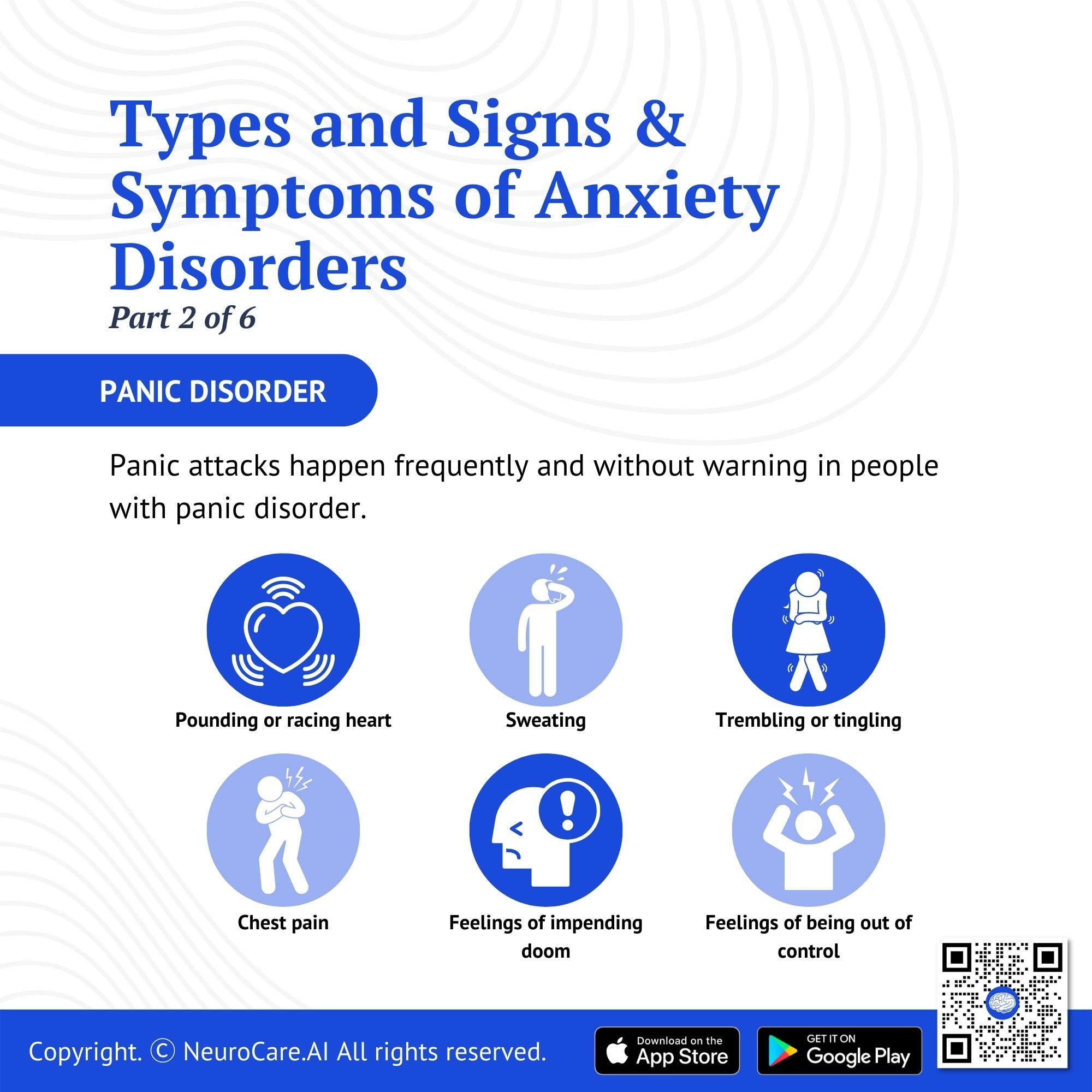
Panic Disorder
Panic attacks happen frequently and without warning in people with panic disorder. Panic attacks are sudden periods of intense fear, discomfort, or a sense of losing control even when there is no clear danger or trigger. Not everyone who experiences a panic attack will develop panic disorder.
During a panic attack, a person may experience:
- Pounding or racing heart
- Sweating
- Trembling or tingling
- Chest pain
- Feelings of impending doom
- Feelings of being out of control
People who suffer from panic disorder frequently worry about when their next attack will occur and actively try to prevent attacks in the future by avoiding the locations, circumstances, or behaviors they associate with panic attacks. Panic attacks can occur as frequently as several times a day or as rarely as a few times a year.
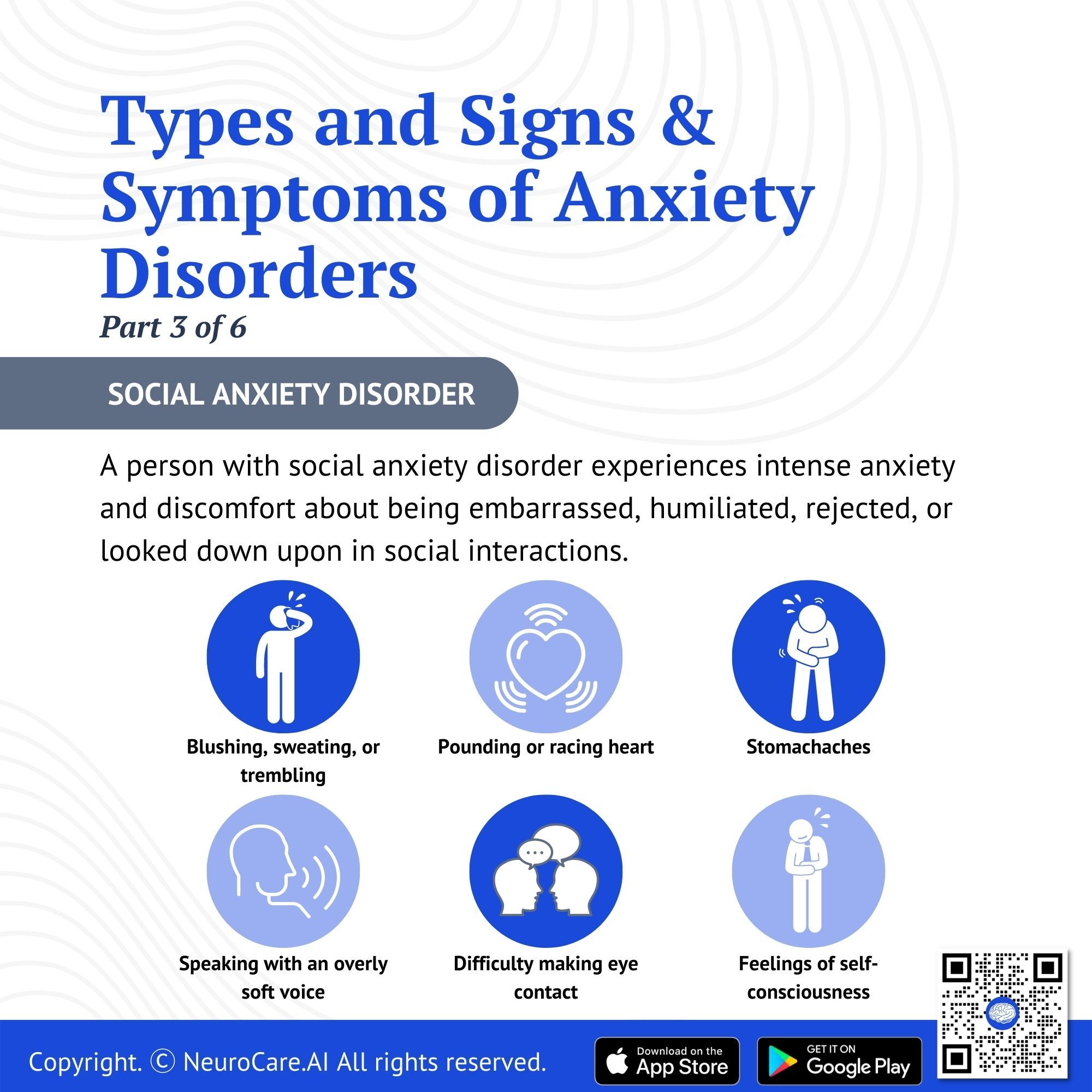
Social Anxiety Disorder
A person with social anxiety disorder experiences intense anxiety and discomfort about being embarrassed, humiliated, rejected, or looked down upon in social interactions. People who have this disorder will make efforts to avoid the situation or endure it with great anxiety. Common examples are extreme fear of public speaking, meeting new people, or eating/drinking in public. The fear or anxiety lasts for at least six months and interferes with daily functioning.
People with social anxiety disorder may experience:
- Blushing, sweating, or trembling
- Pounding or racing heart
- Stomachaches
- Rigid body posture or speaking with an overly soft voice
- Difficulty making eye contact or being around people they don’t know
- Feelings of self-consciousness or fear that people will judge them negatively
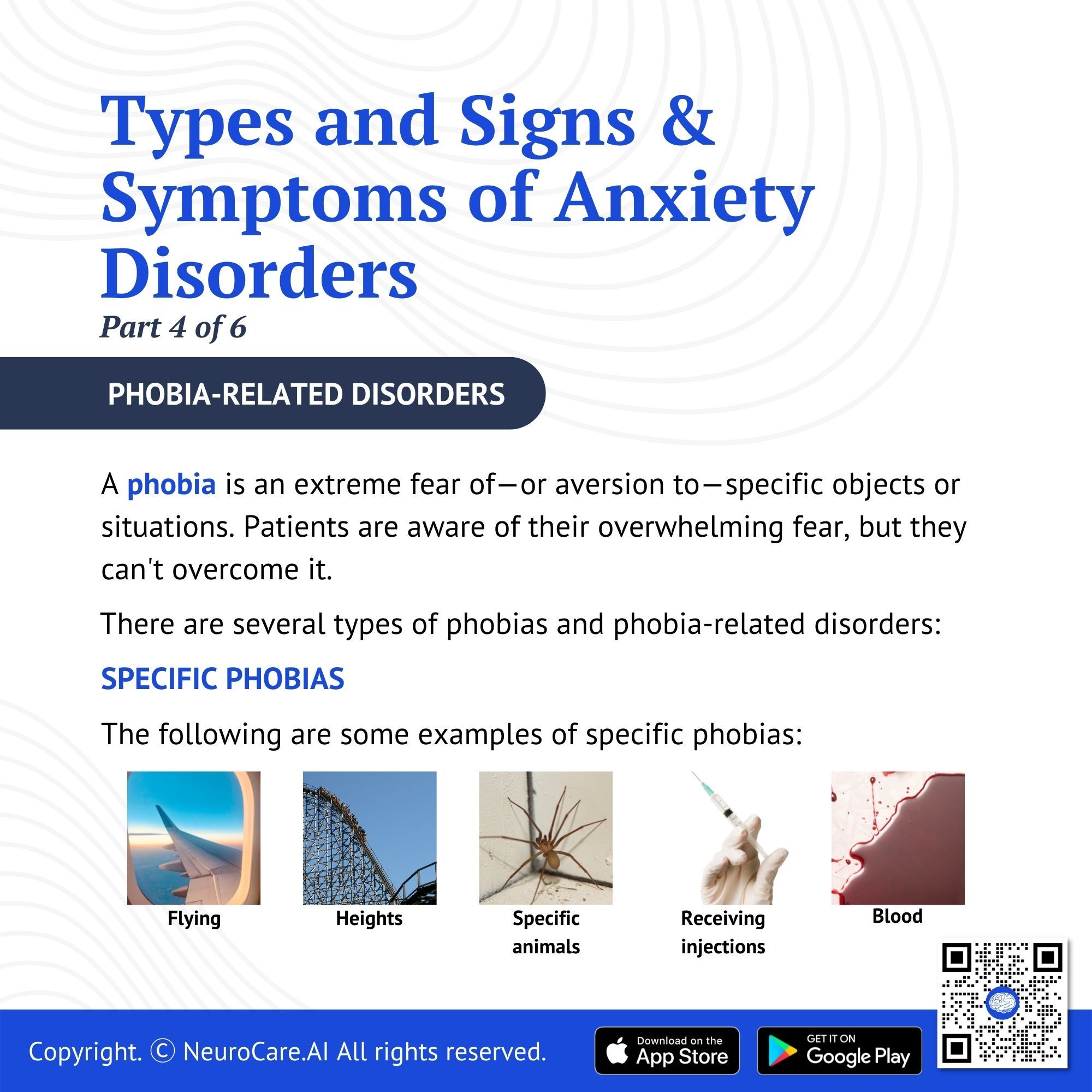
Phobia-related disorders
A phobia is an extreme fear of—or aversion to—specific objects or situations. Patients are aware of their overwhelming fear, but they can't overcome it. These fears cause such distress that some people go to extreme lengths to avoid what they fear.
People with a phobia:
- May have an irrational or excessive worry about encountering the feared object or situation
- Take active steps to avoid the feared object or situation
- Experience immediate intense anxiety upon encountering the feared object or situation
- Endure unavoidable objects and situations with intense anxiety
There are several types of phobias and phobia-related disorders:
Specific phobias (sometimes called simple phobias)
People who have a specific phobia, as the term implies, have a severe fear of or experience severe anxiety about a particular kind of object or circumstance. The following are some examples of specific phobias:
- Flying
- Heights
- Specific animals, such as spiders, dogs, or snakes
- Receiving injections
- Blood
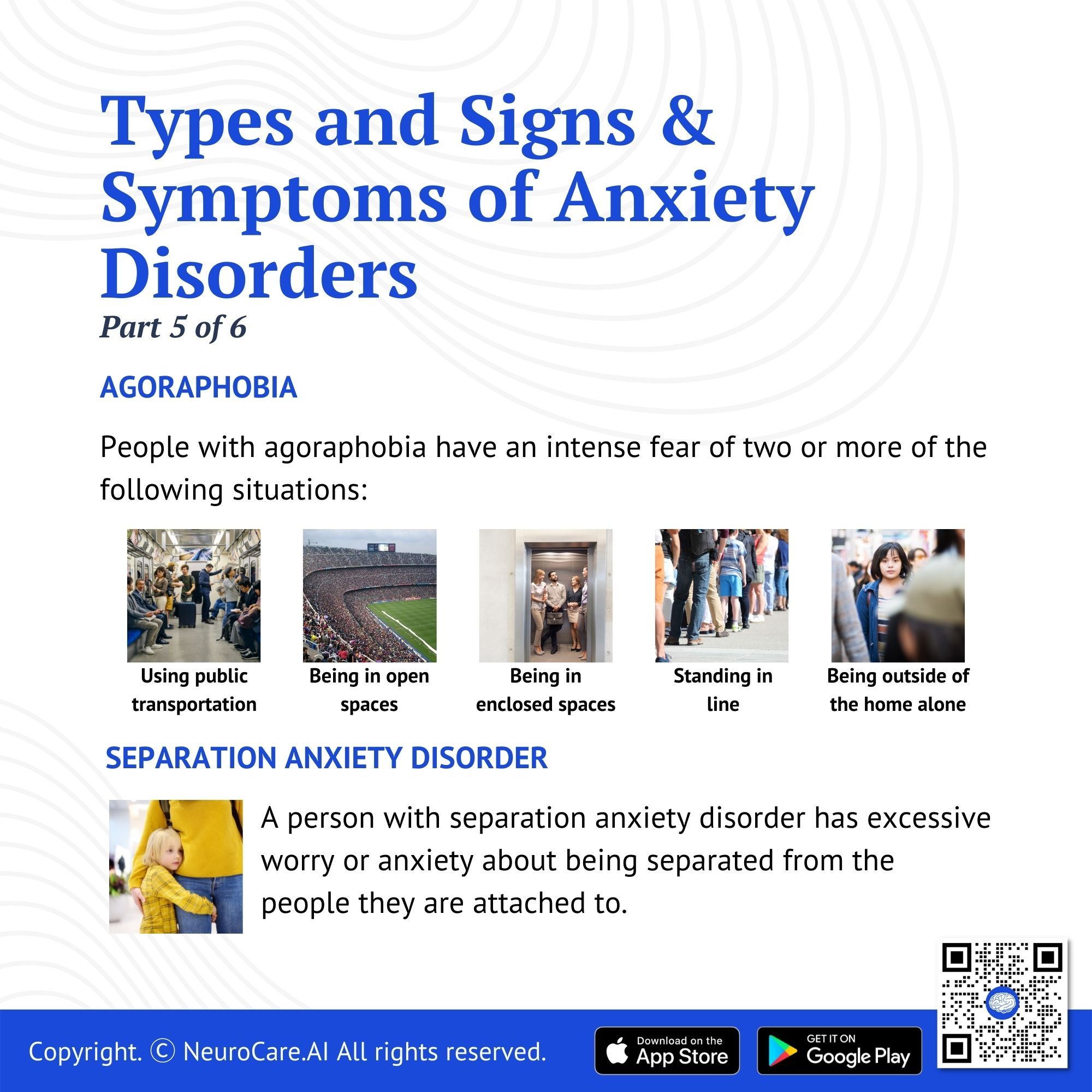
Agoraphobia
People with agoraphobia have an intense fear of two or more of the following situations:
- Using public transportation
- Being in open spaces
- Being in enclosed spaces
- Standing in line or being in a crowd
- Being outside of the home alone
The individual actively avoids the situation, requires a companion, or endures intense fear or anxiety. A person may no longer be able to leave the house if agoraphobia is left untreated. A person can only be diagnosed with agoraphobia if the fear is intensely upsetting or significantly interferes with normal daily activities.
Separation anxiety disorder
Separation anxiety is often thought of as something that only children deal with; however, adults can also be diagnosed with separation anxiety disorder. A person with a separation anxiety disorder has excessive worry or anxiety about being separated from the people they are attached to. The emotion is out of character for the person's age, lasts for a long time (at least four weeks in children and six months in adults), and interferes with daily functioning. A person with a separation anxiety disorder could worry about losing the person they love most all the time, hesitate to leave the house or refuse to spend the night apart from them, or even have nightmares about being separated. Although physical signs of discomfort frequently appear in childhood, symptoms can persist throughout adulthood.
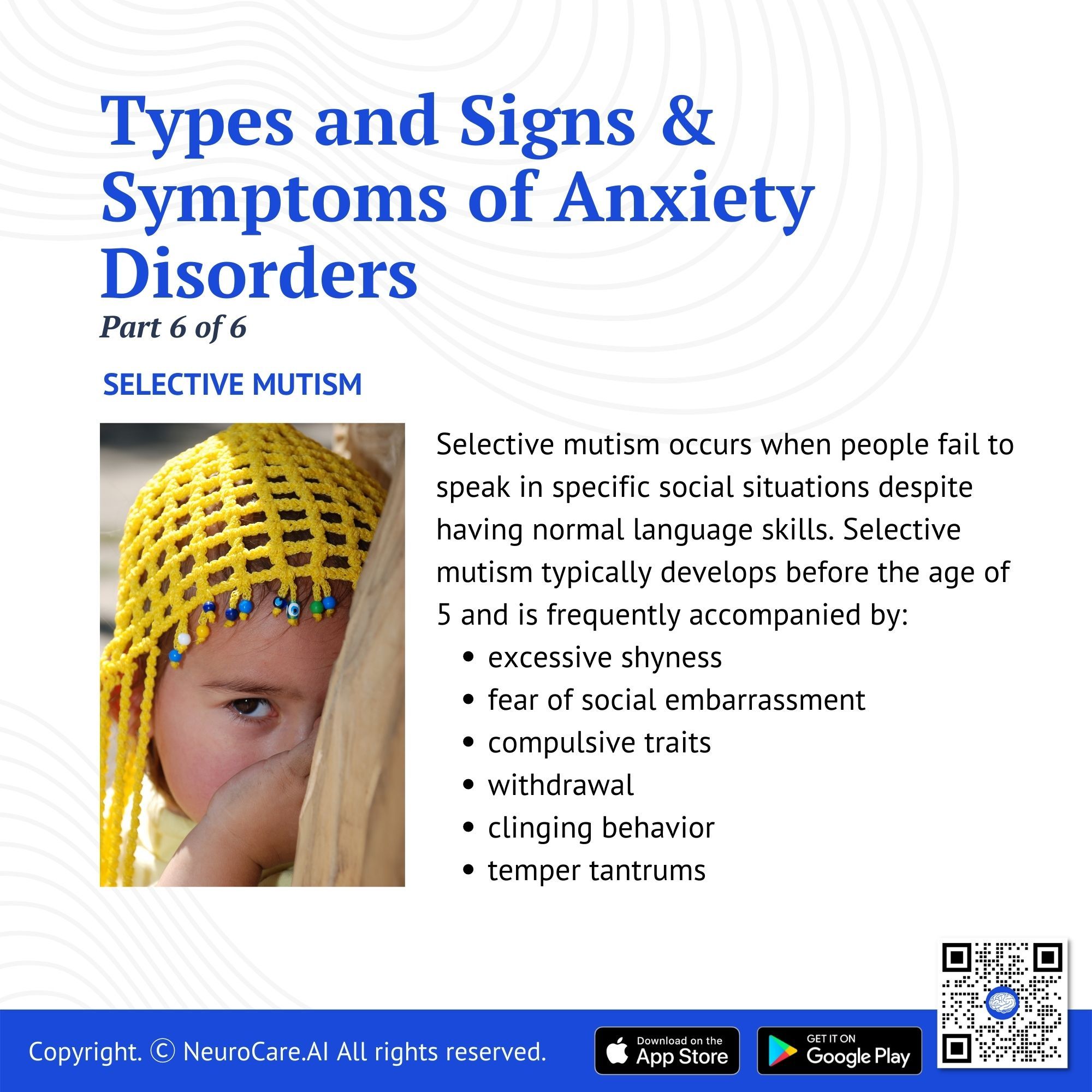
Selective mutism
Selective mutism is a rather uncommon anxiety-related condition. Selective mutism occurs when people fail to speak in specific social situations despite having normal language skills. Selective mutism typically develops before the age of 5 and is frequently accompanied by excessive shyness, fear of social embarrassment, compulsive traits, withdrawal, clinging behavior, and temper tantrums. People diagnosed with selective mutism are often also diagnosed with other anxiety disorders.
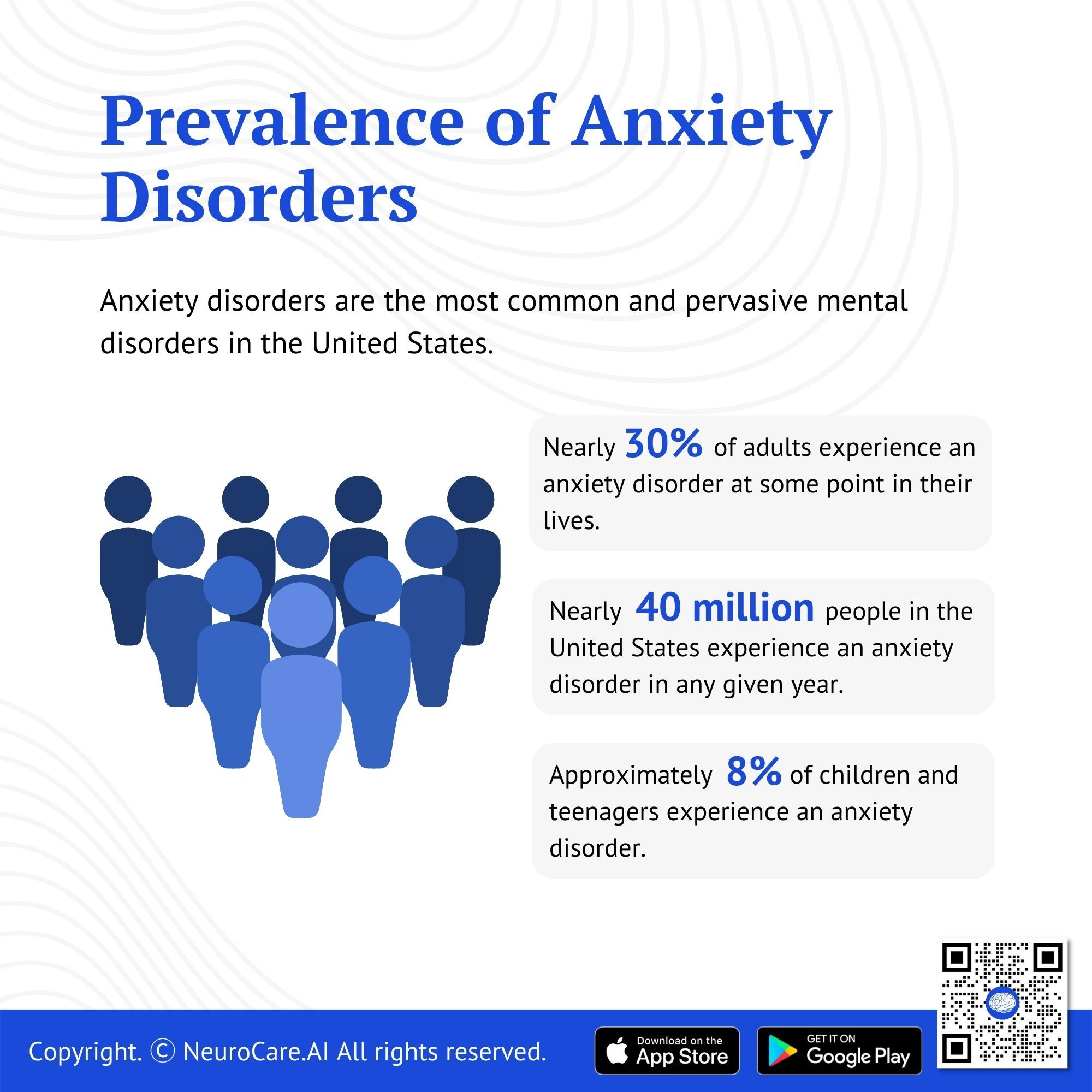
Prevalence of Anxiety Disorders
Anxiety disorders are the most common and pervasive mental disorders in the United States. Nearly 30% of adults experience an anxiety disorder at some point in their lives. National prevalence data indicate that nearly 40 million people in the United States (18%) experience an anxiety disorder in any given year. Approximately 8% of children and teenagers experience an anxiety disorder with most people developing symptoms before the age of 21.
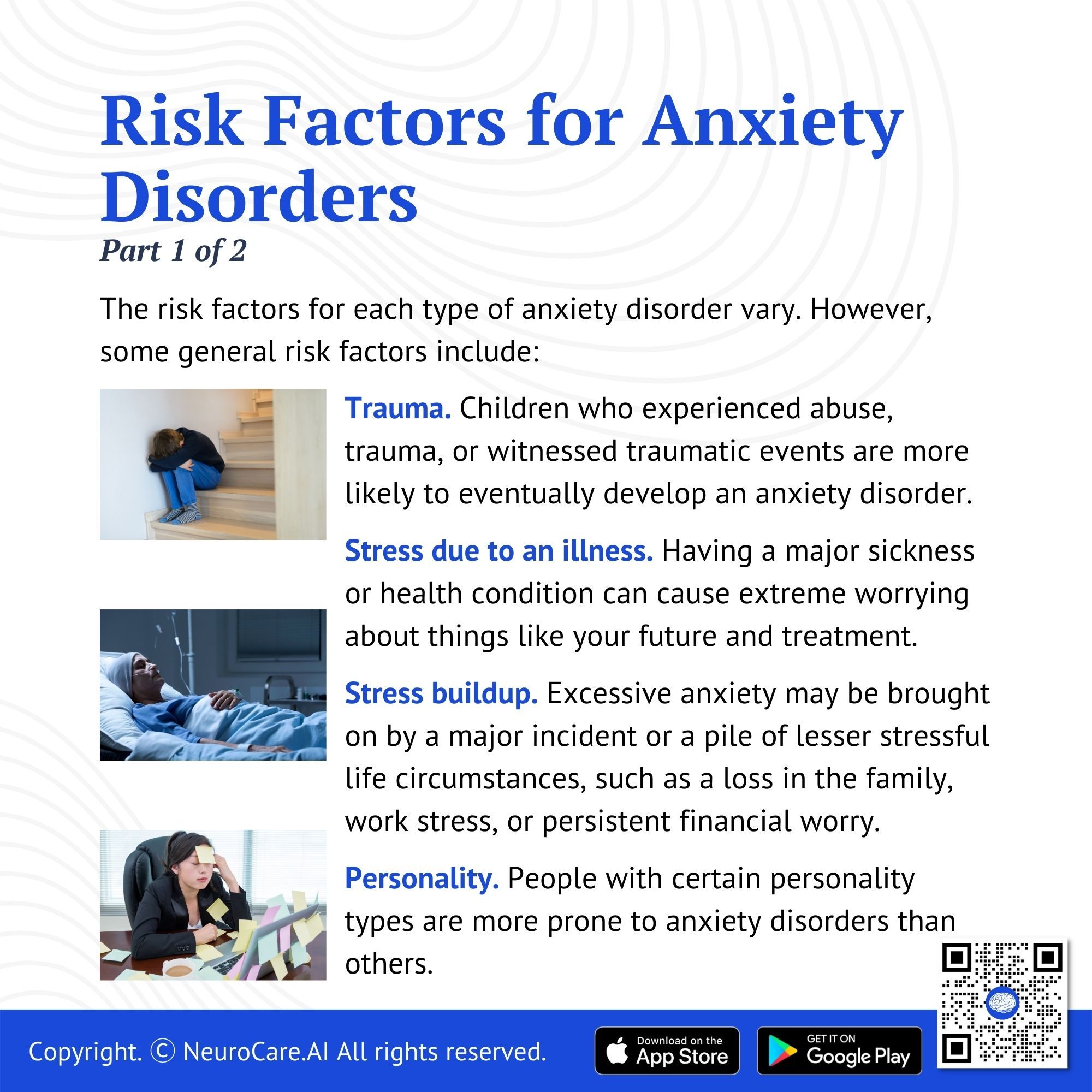
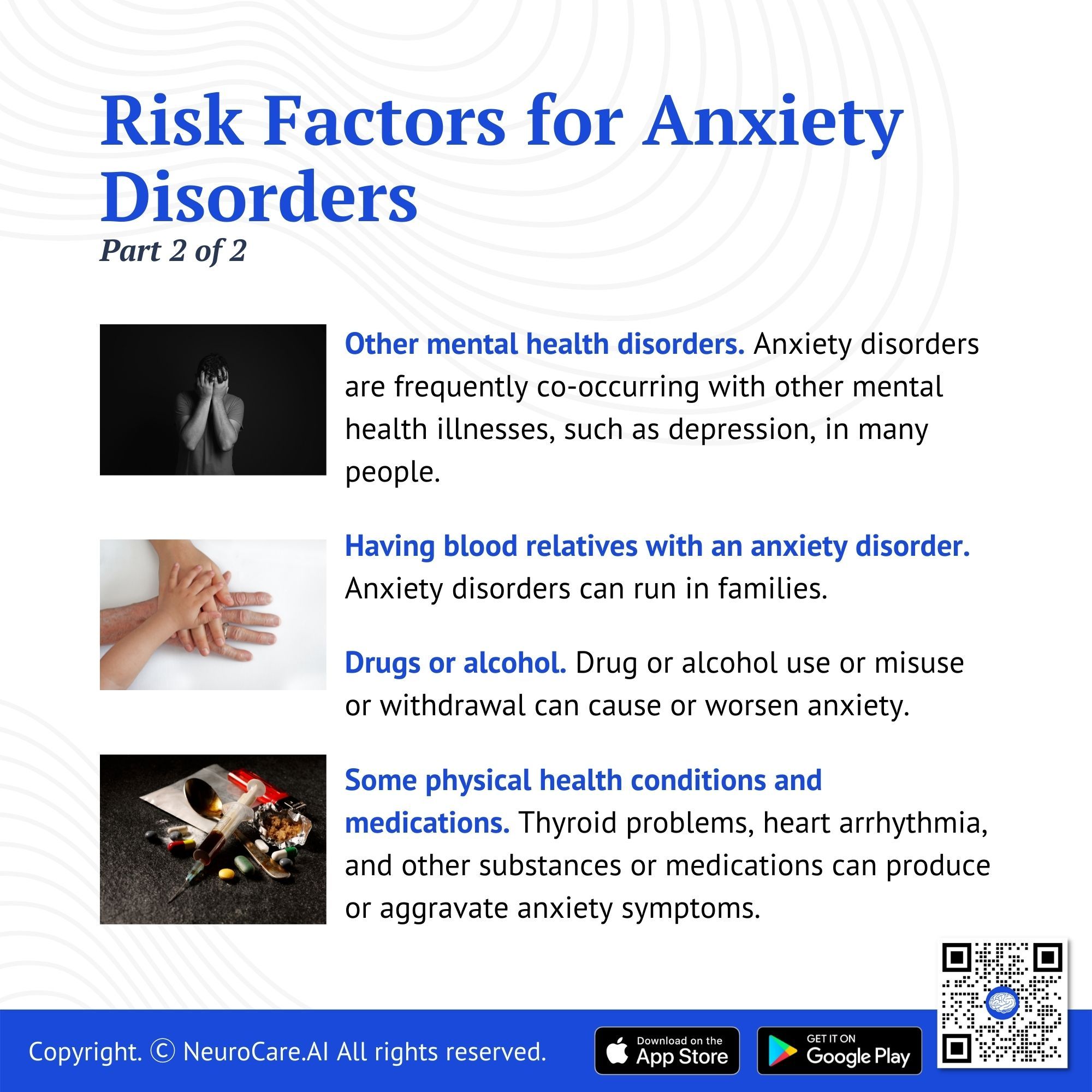
Risk Factors for Anxiety Disorders
Although the exact causes of anxiety disorders are unknown, a combination of factors including genetic, environmental, psychological, and developmental variables are most likely to be at play. There is evidence that anxiety disorders can run in families, indicating that a genetic predisposition as well as stress from the environment might result in the disorders.
The risk factors for each type of anxiety disorder vary. However, some general risk factors include:
- Trauma. Children who experienced abuse, trauma, or witnessed traumatic events are more likely to eventually develop an anxiety disorder. Anxiety disorders can also manifest in adults who had traumatizing experiences.
- Stress due to an illness. Having a major sickness or health condition can cause extreme worrying about things like your future and treatment.
- Stress buildup. Excessive anxiety may be brought on by a major incident or a pile of lesser stressful life circumstances, such as a loss in the family, work stress, or persistent financial worry.
- Personality. People with certain personality types are more prone to anxiety disorders than others.
- Other mental health disorders. Anxiety disorders are frequently co-occurring with other mental health illnesses, such as depression, in many people.
- Having blood relatives with an anxiety disorder. Anxiety disorders can run in families.
- Drugs or alcohol. Drug or alcohol use or misuse or withdrawal can cause or worsen anxiety.
- Some physical health conditions and medications. Thyroid problems, heart arrhythmia, and other substances or medications can produce or aggravate anxiety symptoms.
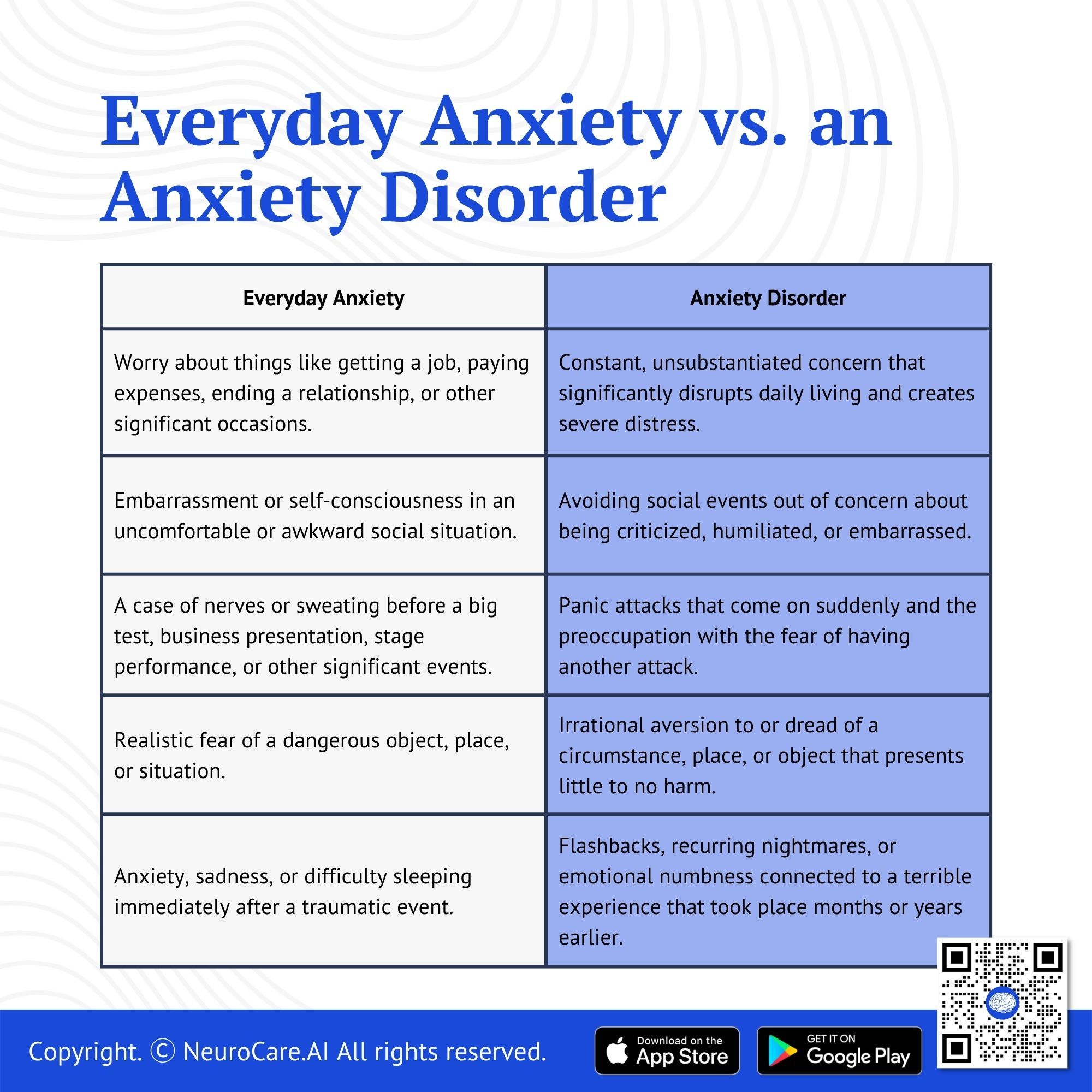
Everyday Anxiety vs. an Anxiety Disorder
Everyday Anxiety | Anxiety Disorder |
Worry about things like getting a job, paying expenses, ending a relationship, or other significant occasions. | Constant, unsubstantiated concern that significantly disrupts daily living and creates severe distress. |
Embarrassment or self-consciousness in an uncomfortable or awkward social situation. | Avoiding social events out of concern about being criticized, humiliated, or embarrassed. |
A case of nerves or sweating before a big test, business presentation, stage performance, or other significant events. | Panic attacks that come on suddenly and the preoccupation with the fear of having another attack. |
Realistic fear of a dangerous object, place, or situation. | Irrational aversion to or dread of a circumstance, place, or object that presents little to no harm. |
Anxiety, sadness, or difficulty sleeping immediately after a traumatic event. | Flashbacks, recurring nightmares, or emotional numbness connected to a terrible experience that took place months or years earlier. |
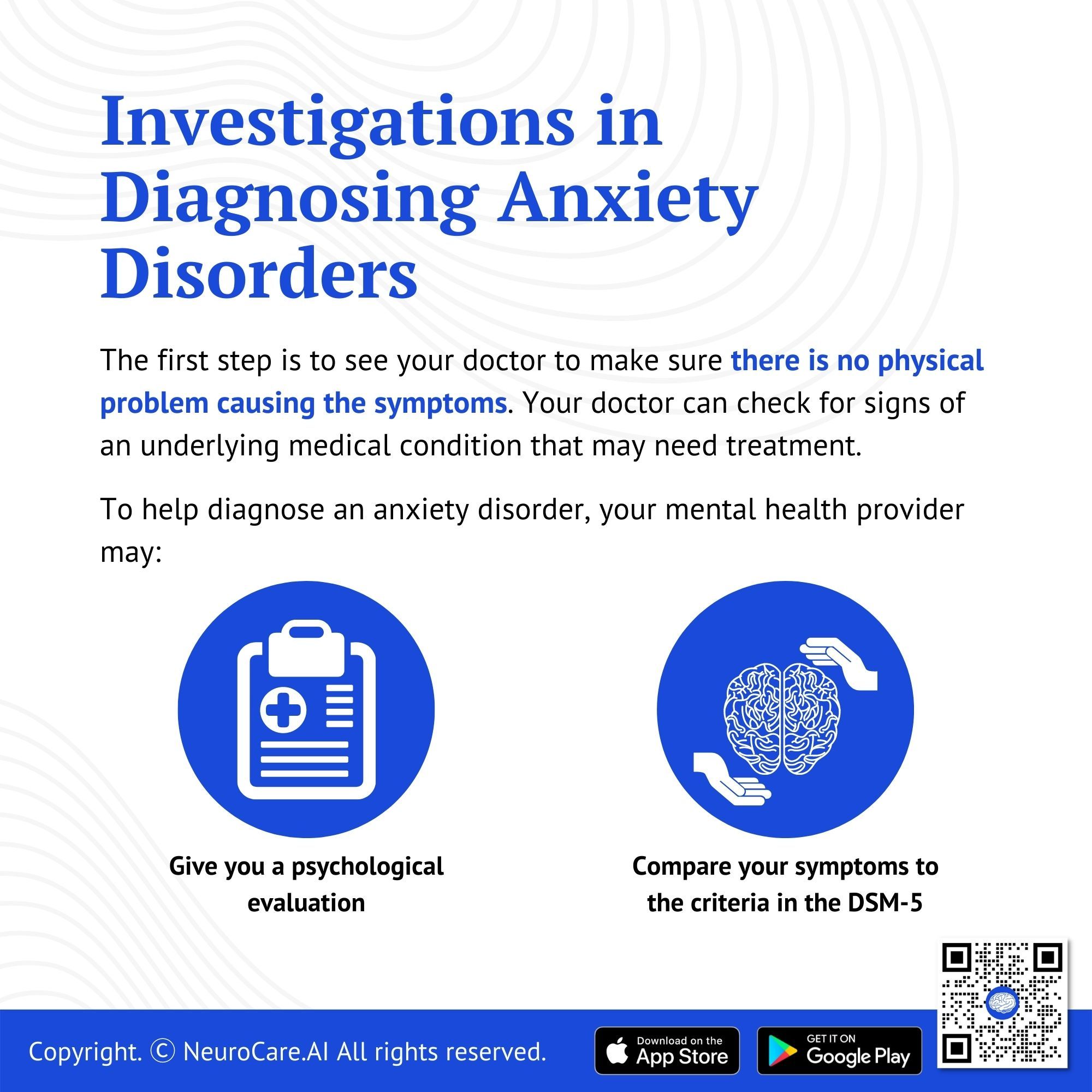
Investigations in Diagnosing Anxiety Disorders
The first step is to see your doctor to make sure there is no physical problem causing the symptoms. Your doctor can check for signs of an underlying medical condition that may need treatment. If you suffer from extreme anxiety, you might need to visit a mental health professional. A psychiatrist is a medical professional who focuses on identifying and treating disorders of the mind. A psychologist and some other mental health specialists can diagnose anxiety and provide counseling (psychotherapy).
To help diagnose an anxiety disorder, your mental health provider may:
- Give you a psychological evaluation. This entails talking about your thoughts, feelings, and behavior to help pinpoint a diagnosis and check for related complications. It can be more difficult to diagnose anxiety disorders since they frequently co-occur with other mental health issues, such as depression or substance abuse.
- Compare your symptoms to the criteria in the DSM-5. The Diagnostic and Statistical Manual of Mental Disorders (DSM-5) issued by the American Psychiatric Association may be used by your mental health provider to diagnose an anxiety disorder.
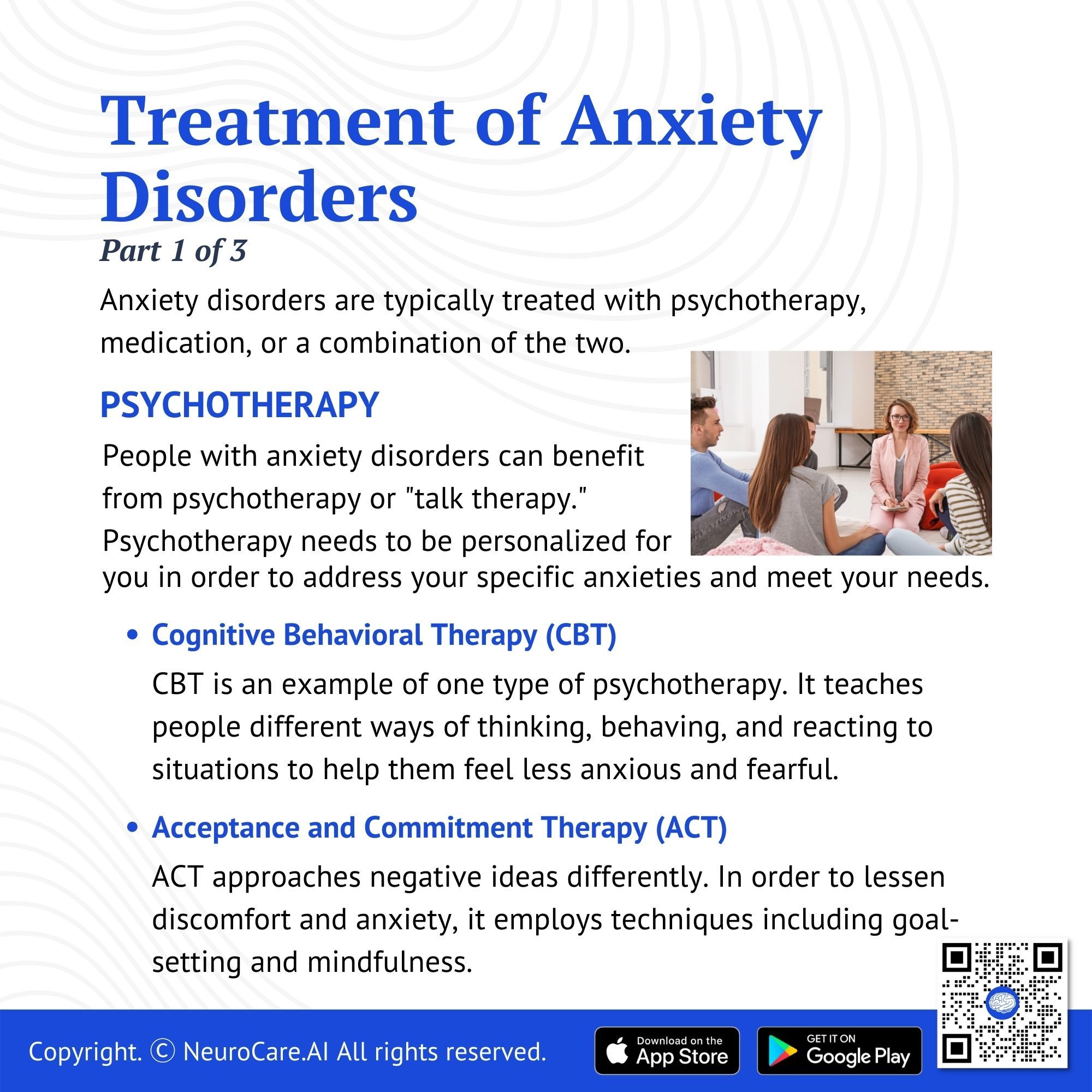
Treatment of Anxiety Disorders
Anxiety disorders are typically treated with psychotherapy, medication, or a combination of the two. There are various strategies to cure anxiety; to find the one that is best for you, consult a healthcare professional.
Psychotherapy
People with anxiety disorders can benefit from psychotherapy or "talk therapy." Psychotherapy needs to be personalized for you in order to address your specific anxieties and meet your needs.
Cognitive Behavioral Therapy
Cognitive Behavioral Therapy (CBT) is an example of one type of psychotherapy that can help people with anxiety disorders. It teaches people different ways of thinking, behaving, and reacting to situations to help them feel less anxious and fearful. CBT has been well studied and is the gold standard for psychotherapy.
Exposure therapy is a CBT method that is used to treat anxiety disorders. To help patients engage in activities they have been avoiding, exposure therapy focuses on facing the concerns at the root of an anxiety disorder. Sometimes, exposure therapy is combined with relaxing techniques.
Acceptance and Commitment Therapy
Acceptance and commitment therapy (ACT) is an additional alternative for treating some anxiety disorders. In contrast to CBT, ACT approaches negative ideas differently. In order to lessen discomfort and anxiety, it employs techniques including goal-setting and mindfulness. Because ACT is a more recent type of psychotherapy than CBT, there are fewer studies evaluating its effectiveness.
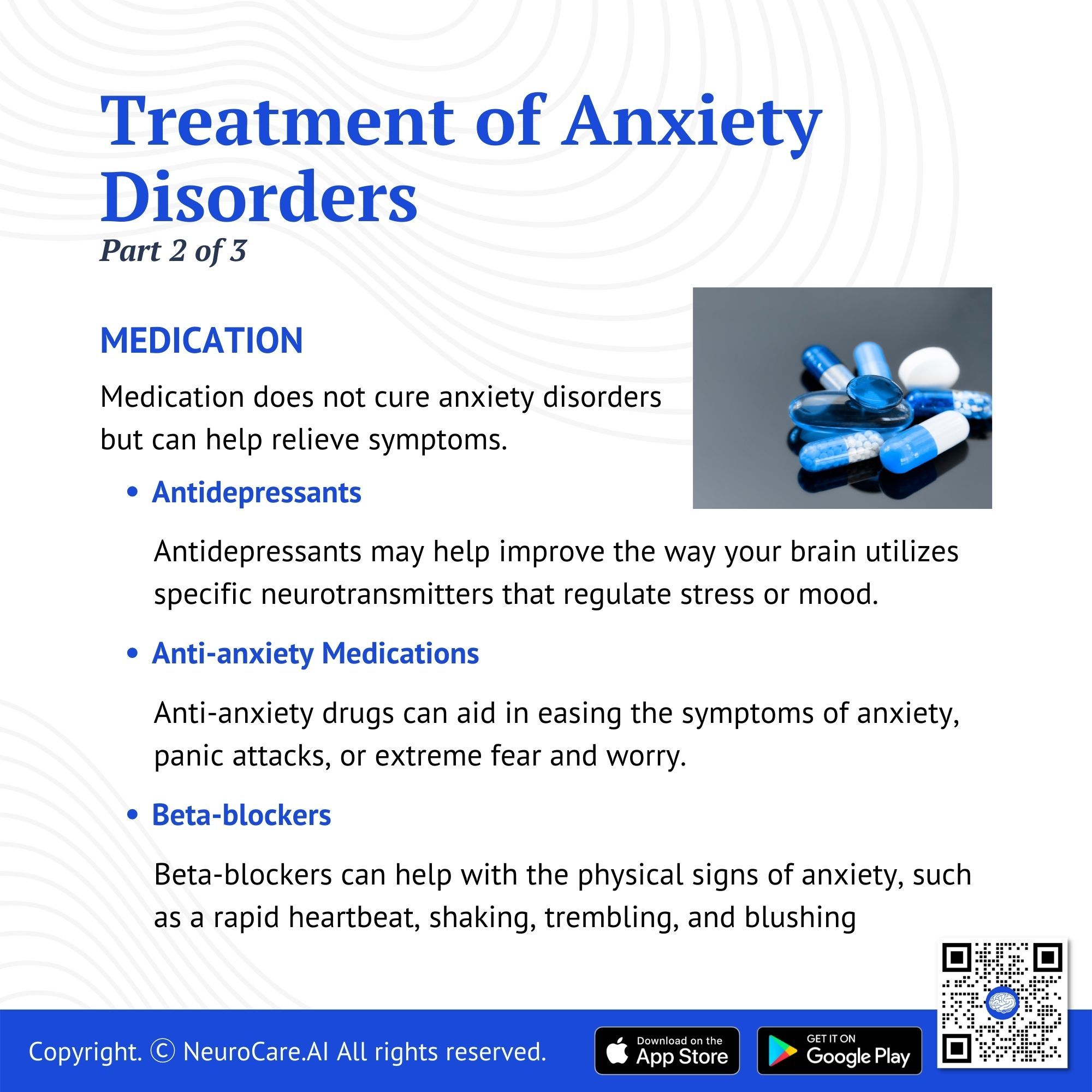
Medication
Medication does not cure anxiety disorders but can help relieve symptoms. A psychiatrist or primary care physician can prescribe medication for anxiety. The most common classes of medications used to combat anxiety disorders are antidepressants, anti-anxiety medications (such as benzodiazepines), and beta-blockers.
Antidepressants
Although antidepressants are typically used to treat depression, they can also be effective in the management of anxiety disorders. They may help improve the way your brain utilizes specific neurotransmitters that regulate stress or mood. You may need to test a few different antidepressants before finding the one that improves symptom relief and with manageable side effects.
Antidepressants can take several weeks to start working so it’s important to give the medication a chance before reaching a conclusion about its effectiveness. Do not discontinue taking antidepressants after you start taking them without consulting a healthcare professional. Your doctor can assist you in gradually and securely lowering your dosage. A sudden stop can result in withdrawal symptoms.
Children, teenagers, and people under the age of 25 may occasionally exhibit more suicidal thoughts or actions when taking antidepressants, particularly in the first few weeks or when the dose is altered. Because of this, antidepressant users of all ages should be properly monitored, particularly in the initial weeks of therapy.
Anti-anxiety Medications
Anti-anxiety drugs can aid in easing the symptoms of anxiety, panic attacks, or extreme fear and worry. The most common anti-anxiety medications are called benzodiazepines. Although benzodiazepines are occasionally used as the first line of treatment for generalized anxiety disorder, they have both benefits and drawbacks.
Benzodiazepines are effective in relieving anxiety and take effect more quickly than antidepressant medications. But some people develop a tolerance to these drugs and require increasing doses to achieve the same results. Some even start to depend on them. Healthcare professionals typically recommend benzodiazepines for brief periods of time to prevent these issues.
People may experience withdrawal symptoms or experience a return of their anxiety if they abruptly stop taking benzodiazepines. Therefore, benzodiazepines should be discontinued gradually. Your healthcare practitioner can assist you in gradually and safely lowering your dose.
Beta-blockers
Beta-blockers can help with the physical signs of anxiety, such as a rapid heartbeat, shaking, trembling, and blushing, even though they are most frequently used to treat high blood pressure. These drugs can help people keep physical symptoms under control when taken for short periods. They can also be administered "as needed" to reduce acute anxiety, including to prevent some predictable forms of performance anxieties.
Choosing the Right Medication
People should work closely with a healthcare professional to determine which medicine is appropriate for them because some types of drugs may work better for particular types of anxiety disorders. The symptoms of anxiety disorders may be made worse by some substances, including caffeine, some over-the-counter cold remedies, illegal drugs, and herbal supplements, or they may interact negatively with prescribed medications. People should see a healthcare professional to find out which substances are safe and which ones they should avoid.
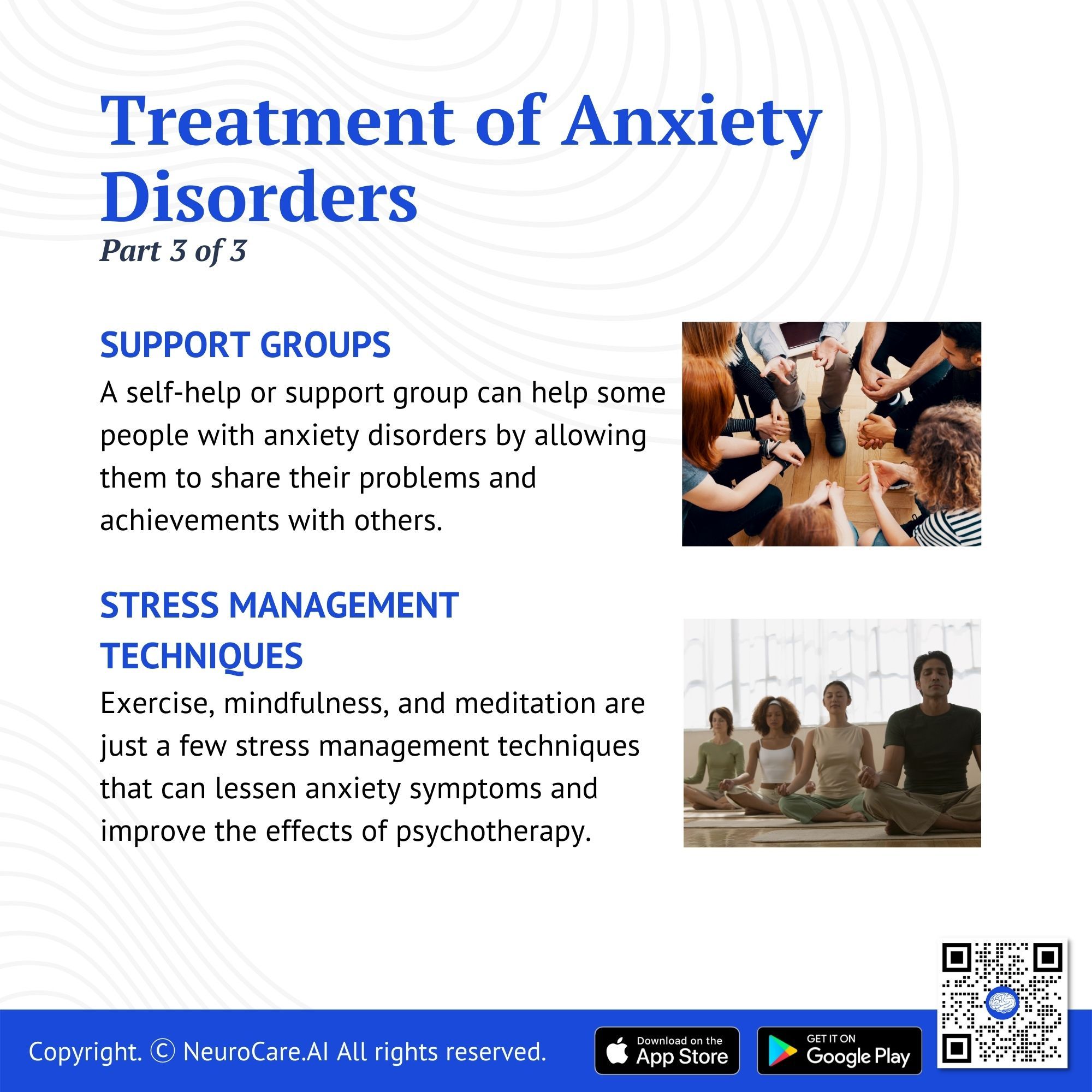
Support Groups
A self-help or support group can help some people with anxiety disorders by allowing them to share their problems and achievements with others. Support groups are available both online and in person. However, any recommendations you get from a support group member should be used with caution and should not take the place of treatment suggestions from a healthcare professional.
Stress Management Techniques
Exercise, mindfulness, and meditation are just a few stress management techniques that can lessen anxiety symptoms and improve the effects of psychotherapy. By talking with a healthcare professional, you may find out more about how these techniques will enhance your therapy.
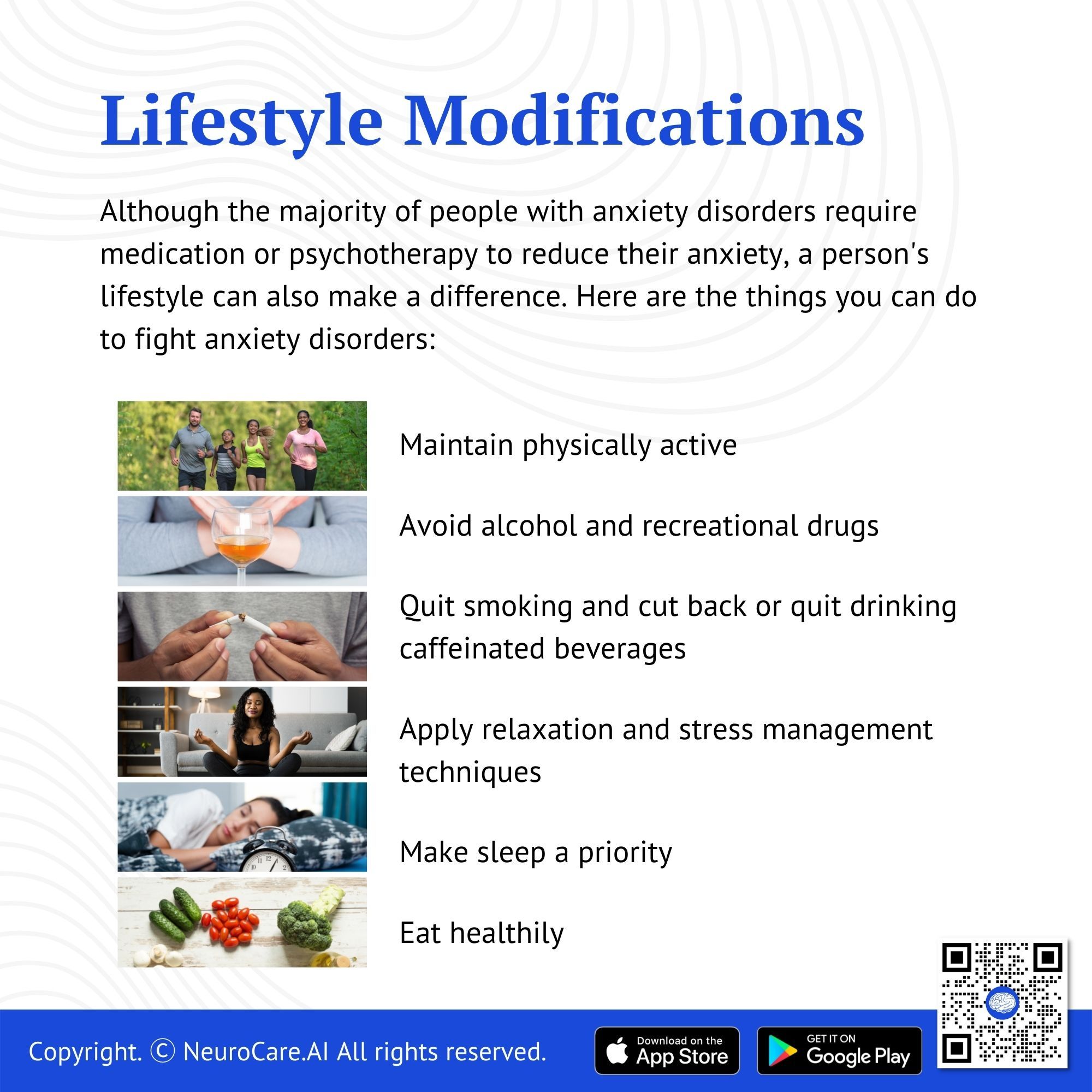
Lifestyle Modifications
Although the majority of people with anxiety disorders require medication or psychotherapy to reduce their anxiety, a person's lifestyle can also make a difference. Here are the things you can do to fight anxiety disorders:
- Maintain physical activity. Create a schedule so that you are active most days of the week. Exercise is a highly effective stress reliever. It might make you feel better and maintain your health. Begin cautiously and progressively up the quantity and intensity of your exercise.
- Avoid alcohol and recreational drugs. These substances either increase or worsen anxiety. Visit your doctor or look for a support group if you are unable to stop on your own.
- Quit smoking and cut back or quit drinking caffeinated beverages. Caffeine and nicotine can both make anxiety worse.
- Apply relaxation and stress management techniques. Examples of relaxation methods that can reduce anxiety include visualization techniques, meditation, and yoga.
- Make sleep a priority. Make every effort to ensure that you are receiving enough sleep to feel rested. Consult your doctor if you are having trouble sleeping.
- Eat healthily. Healthy eating, such as focusing on vegetables, fruits, whole grains, and fish, may be helpful to reduce anxiety, but more research is required.
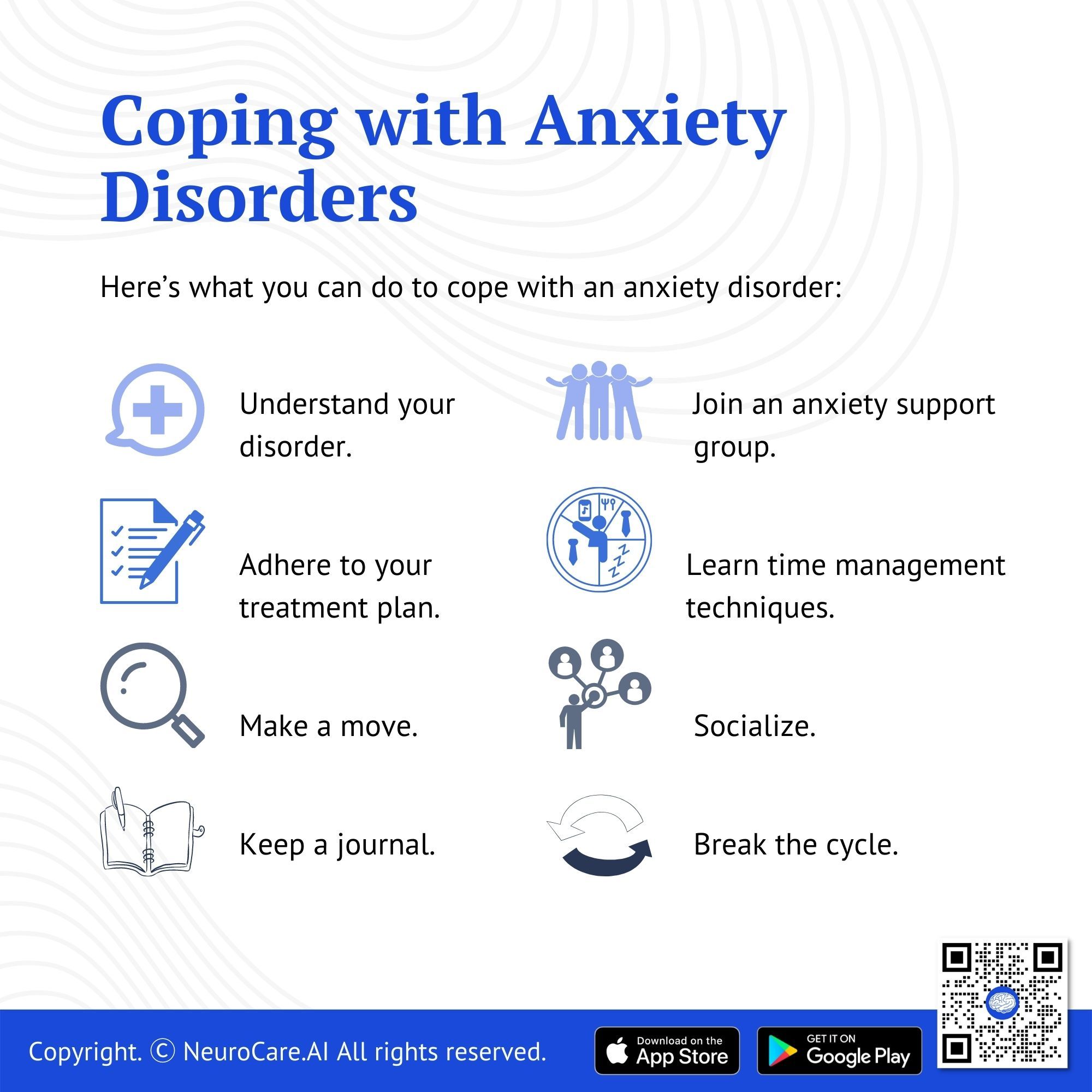
Coping with Anxiety Disorders
Here’s what you can do to cope with an anxiety disorder:
- Understand your disorder. Consult your physician or mental health professional. Discover the potential causes of your specific condition and the possible therapies that would work the best for you. Involve your family and friends and ask for their support.
- Adhere to your treatment plan. Take medications as directed. Attend your treatment sessions and complete any assignments your therapist may set. Consistency can significantly impact your results particularly when it comes to taking your medication.
- Make a move. Find out what makes you anxious or stressed out. Practice the strategies you developed with your mental health provider so you are prepared to deal with anxious feelings in these circumstances.
- Keep a journal. Keeping track of your personal life can help you and your mental health provider figure out what stresses you out and what makes you feel better.
- Join an anxiety support group. Remember that you aren't alone. Support groups offer compassion, understanding, and shared experiences. Information on getting support is available from organizations like the Anxiety and Depression Association of America and the National Alliance on Mental Illness.
- Learn time management techniques. By carefully managing your time and energy, you can lessen anxiety.
- Socialize. Don't let anxiety keep you away from people you care about or your favorite activities.
- Break the cycle. Take a brisk walk or engage in a hobby to divert your attention from your troubles when you're feeling anxious.
.jpg)
Seek Professional Help
Anxiety disorders can be treated. With professional care, a lot of patients receive significant symptom reduction and an increase in their quality of life. If you are experiencing symptoms of anxiety disorder, consult a doctor for professional help. They will be able to diagnose the condition and provide treatment options.
Reference:
Anxiety and Depression Association of America. (2022, October 25). What are anxiety and depression. https://adaa.org/understanding-anxiety
National Institute of Mental Health. (2022, April). Anxiety disorders. https://www.nimh.nih.gov/health/topics/anxiety-disorders
American Psychiatric Association. (2021, June). Anxiety disorders. https://www.psychiatry.org/patients-families/anxiety-disorders
Mayo Clinic. (2018, May 4). Anxiety disorders. https://www.mayoclinic.org/diseases-conditions/anxiety/symptoms-causes/syc-20350961
DISCLAIMER:
The information in this document is for general educational purposes only. It is not intended to substitute for personalized medical professional advice. NeuroCare.AI makes every effort to provide accurate and timely information, but makes no guarantee in this regard and disclaims responsibility for adverse consequences resulting from its use. For further information, consult a physician and the organization referred to herein.
AizaMD™: Revolutionizing Clinical Documentation
Discover the power of our ambient clinical documentation system, designed to transform clinical encounters into structured SOAP notes with unmatched ease. Experience exceptional value for less than $3 per day—cheaper than your daily coffee!
- Save Time: Free up over 90 minutes daily for each provider.
- Boost Revenue: Increase daily revenue by at least $1,000 per provider.
- Enhance Coding Quality: Our detailed documentation supports superior coding accuracy, ensuring optimal reimbursement.
- Maximize Engagement and Interaction: Dedicate more time to patient care and less to typing, fostering richer and more effective conversations between clinicians and patients
AizaMD™: Automated Radiology Report Generation!
Discover our breakthrough Radiology AI reporting platform built on Ambient AI. It enhances productivity and minimizes fatigue. Benefit from best-in-class accuracy with our automated radiology report generation, all at market-leading pricing.
📈 Efficiency: Cut dictation times by up to 50% (Less words, More report!
🎯 Focus: Keep your eyes on the images, not the keyboard!
💸 Revenue: Boost revenue by at least 20%
📑 Clarity: Patient summary in plain English
